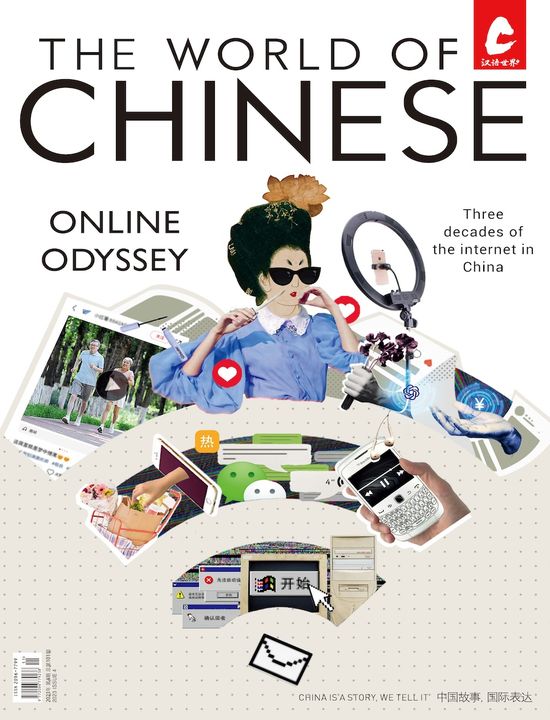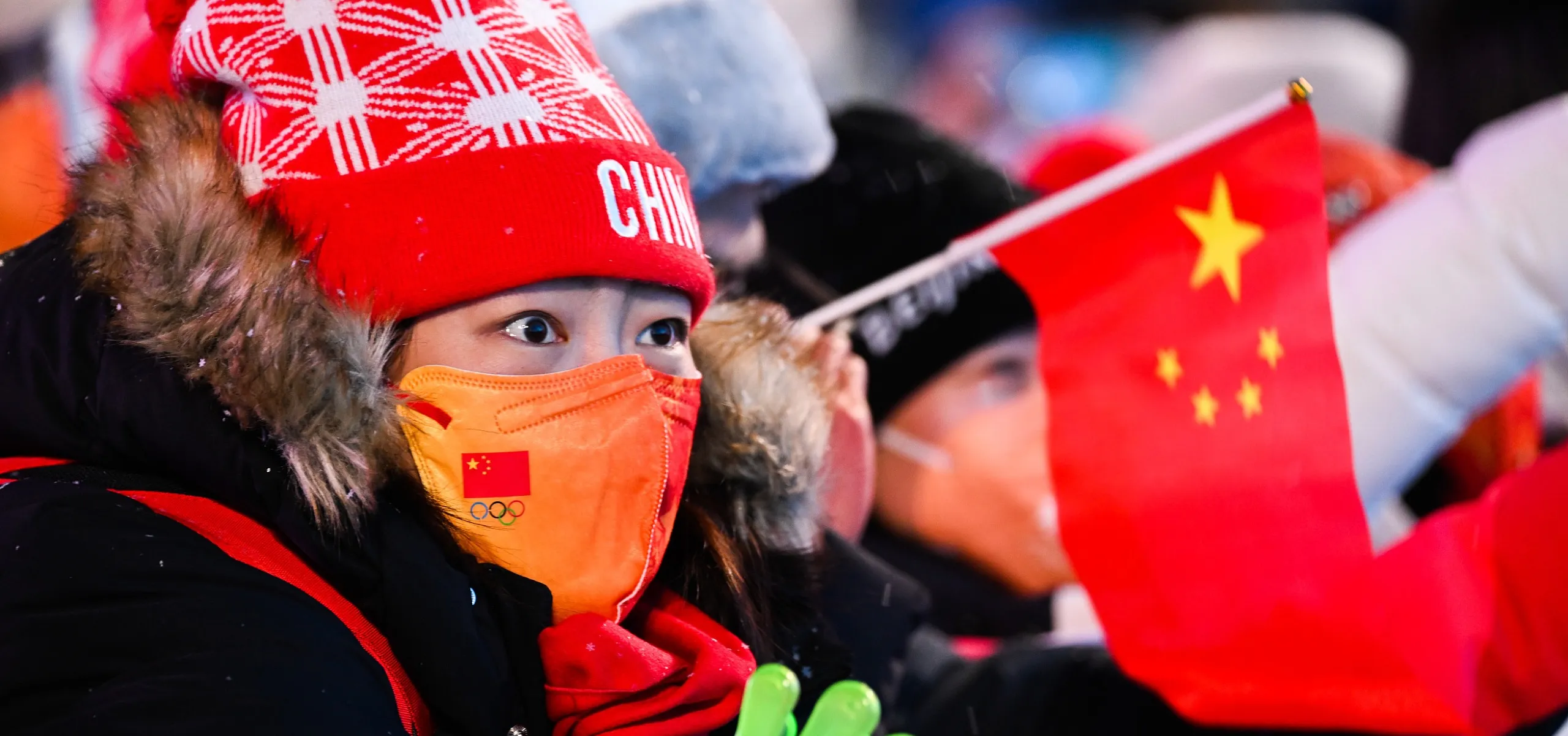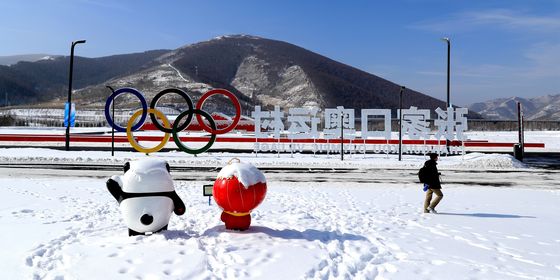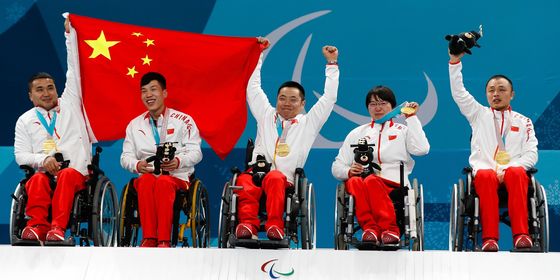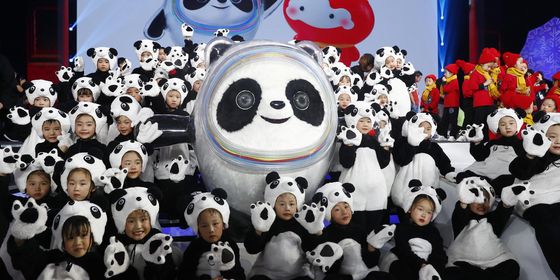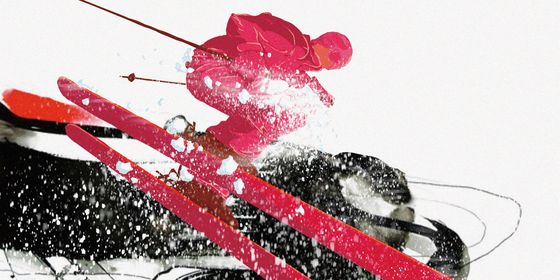Learn some of the Winter Olympics slang popular with Chineses netizens
The Beijing 2022 Winter Olympics may be wrapping up, but the Games’s legacy on the Chinese internet is likely to last much longer, as the memes and new slang birthed over the last fortnight continue to circulate faster than a skeleton racer flying down an icy course. Apart from being inspired by athletes’ awesome performances and touching shows of sportsmanship, netizens have also taken a shine to those who fulfilled their “Olympic dreams” in hilarious ways.
Bing Dwen Dwen (冰墩墩 Bīng Dūndūn), the cute, chubby, ice-encased panda mascot of the Beijing Games, unexpectedly became a smash hit online. Bing Dwen Dwen has been taking on the “4A challenge,” or “Quad Axel challenge,” by trying to complete the most challenging jump (involving four rotations in the air) in figure skating, but almost always clumsily spins and falls on its face. The panda is never deterred though, and the “lifetime-strong Bing Dwen Dwen (一生要强冰墩墩 yìshēng yàoqiáng Bīng Dūndūn),” as the it has been dubbed, lightened the day of many netizens. “[Without seeing it] how could you understand what the Olympic spirit is (你懂什么是奥林匹克精神 Nǐ dǒng shénme shì Àolínpǐkè jīngshén)?” a common refrain goes online.
The panda cub has attracted billions of views, discussions, and posts on micro-blogging platform Weibo. It became a “new ‘data traffic star’ (新晋‘顶流’ xīnjìn ‘dǐngliú’),” snatching the crown from Linabell, a pink fox mascot from Shanghai Disneyland popular with youngsters.
Bing Dwen Dwen’s popularity sparked a buying frenzy for Olympics memorabilia, especially Bing Dwen Dwen plush dolls, which sell for upwards of 190 yuan at licensed merchandise stores. In Beijing, consumers queued for hours in the freezing cold to try and get their hands on their own Bing Dwen Dwen: “I am frozen into an ice cube, but still haven’t grabbed a Bing Dwen Dwen (冻成冰墩墩,我还是没抢到冰墩墩 Dòngchéng Bīng Dūndūn, wǒ háishì méi qiǎngdào Bīng Dūndūn),” one comment from a disgruntled shopper reads on Weibo. Meanwhile, the regular casual Chinese greeting of “have you eaten (你吃了吗 Nǐ chīle ma)?” has humorously morphed into “Do you have a Bing Dwen Dwen yet (你有冰墩墩了吗 Nǐ yǒu Bīng Dūndūn le ma)?”
Facing the struggle of “difficult to get a single Bing Dwen Dwen (一墩难求 yìdūn nánqiú),” many Bing Dwen Dwen-producing factories reopened early during the Spring Festival holiday to manufacture the cuddly panda, hoping to make the “freedom of owning a Bing Dwen Dwen (冰墩墩自由 Bīng Dūndūn zìyóu)” and “a Bing Dwen Dwen in every household (一户一墩 yíhù yìdūn)” a reality.
Meanwhile, Wang Meng, China’s most decorated Winter Olympian of all time with four golds in short-track speed skating across the 2006 and 2010 Games, also gained plenty of attention for her humorous commentary in her distinctive Northeast (Dongbei) accent. Her “roaring commentary (咆哮式解说 páoxiàoshì jiěshuō)” and “chatty commentary (唠嗑式解说 làokēshì jiěshuō)” left her co-commentator Huang Jianxiang, a popular and experienced sports show host, with almost no chance to speak.
When Chinese skater Wu Dajing crossed the finish line at almost the same time as his Italian competitor in the short track speed skating mixed relay event and everyone was waiting for the final result to be announced, Wang slapped the table and roared: “My eyes are like rulers. I’m sure China has won! There’s no need to watch the replay (我的眼睛就是尺!我告诉你们肯定赢了!不用看回放了 Wǒ de yǎnjīng jiùshì chǐ! Wǒ gàosù nǐmen kěndìng yíngle! Bú yòng kàn huífàng le)!”
The “Meng God (濛主 Méngzhǔ)”—a play on “盟主 (méngzhǔ),” which refers to the leader of an alliance—won high praise from viewers, who urged TV producers to “weld Wang Meng to the commentary stage (请把王濛‘焊’在解说台 Qǐng bǎ Wáng Méng ‘hàn’ zài jiěshuōtái).”
Northeast China is home to many outstanding winter sports athletes, like Wang, due to its frigid, snowy winters—100 of China’s 176 competitors at these Games are from Dongbei. As a plethora of this year’s athletes gave interviews to the media, many in thick Northeastern drawls, the Dongbei dialect also became a trending topic online.
On Feb 12, speed skater Gao Tingyu not only set a new Olympic record when he won the men’s 500-meter final, but also challenged Putonghua-speaking viewers and interpreters around the world when he used the Dongbei dialect word “格路 (gélù)” when asked to describe his personality in a news conference. The term basically means extraordinarily different in a way that may be considered pejorative, though it was later translated to “offbeat” in some media.
Netizens may be sad to see these Games draw to a close this weekend, but they will have more chances to fawn over cute mascots, humourous commentary, and Dongbei accents soon—the 2022 Paralympic Winter Games begin on March 4.
